Responsible Management in Tourism: A Critical Analysis Report
VerifiedAdded on 2023/06/11
|16
|4047
|159
Report
AI Summary
This report provides an overview of responsible management in tourism, emphasizing sustainable practices and ethical considerations. It explores the concept of sustainable and responsible management, discussing relevant theories and principles. The report critically analyzes the application of these concepts within tourism and hospitality organizations, highlighting stakeholder engagement and approaches to enhance responsible tourism practices. Examples like Bhutan's tourism policy, Mdumbi Backpackers, Six Senses Resort in Fiji, Feynan Ecolodge, and Bom Bom Water project illustrate the practical implementation of sustainable initiatives. The analysis covers the efficient use of resources, preservation of heritage, and the importance of socio-cultural engagement in fostering sustainable tourism development. This document is available on Desklib, where students can find a wide array of solved assignments and study resources.
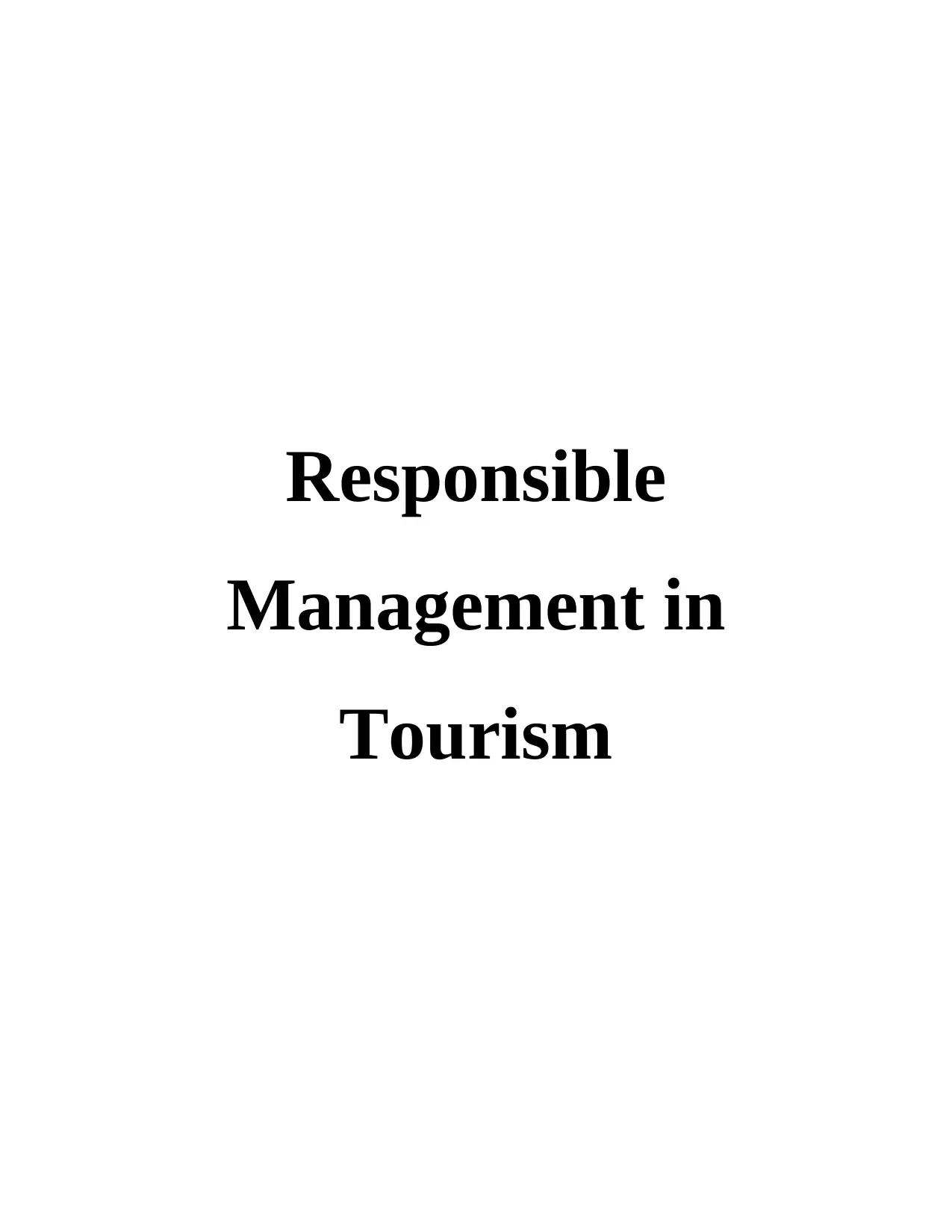
Responsible
Management in
Tourism
Management in
Tourism
Paraphrase This Document
Need a fresh take? Get an instant paraphrase of this document with our AI Paraphraser
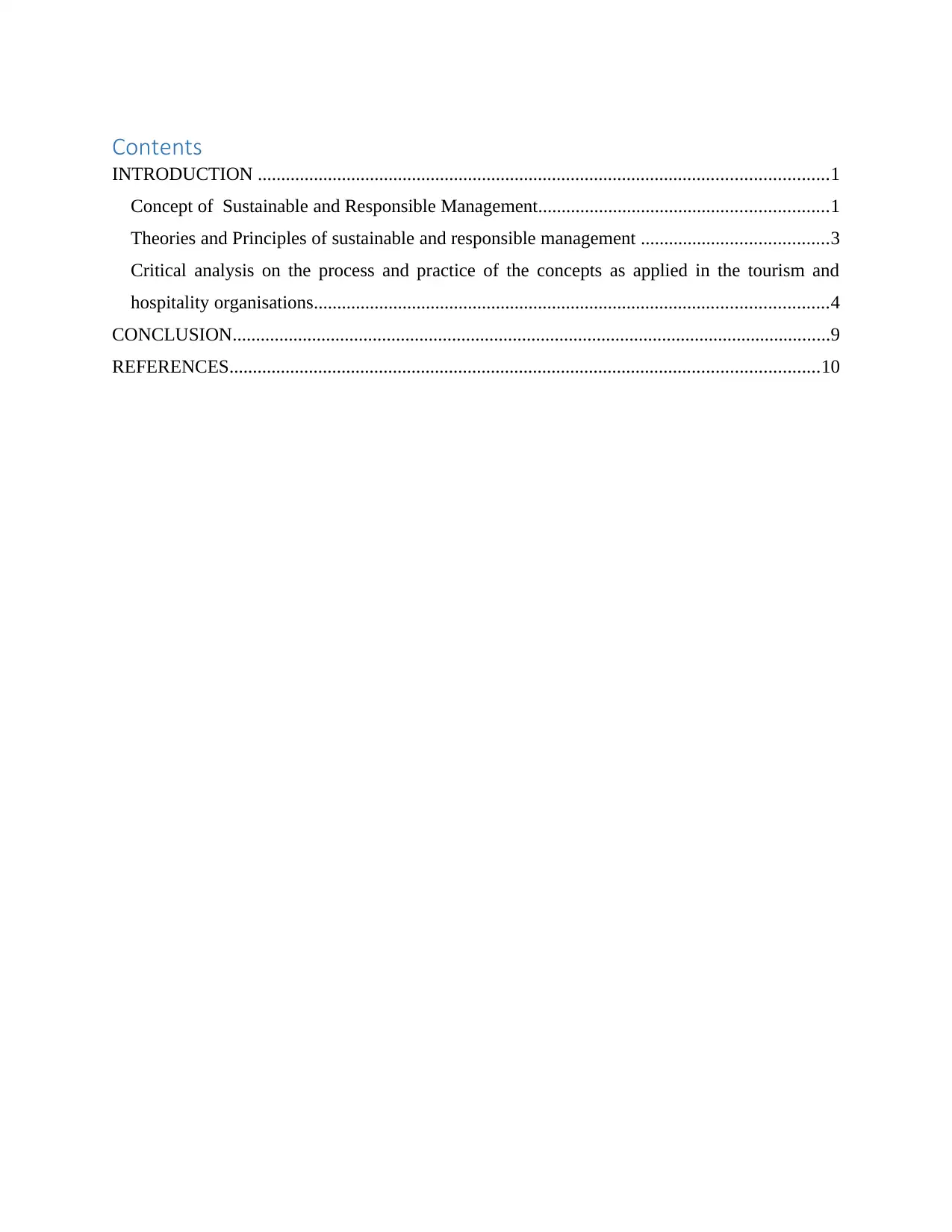
Contents
INTRODUCTION ..........................................................................................................................1
Concept of Sustainable and Responsible Management..............................................................1
Theories and Principles of sustainable and responsible management ........................................3
Critical analysis on the process and practice of the concepts as applied in the tourism and
hospitality organisations..............................................................................................................4
CONCLUSION................................................................................................................................9
REFERENCES..............................................................................................................................10
INTRODUCTION ..........................................................................................................................1
Concept of Sustainable and Responsible Management..............................................................1
Theories and Principles of sustainable and responsible management ........................................3
Critical analysis on the process and practice of the concepts as applied in the tourism and
hospitality organisations..............................................................................................................4
CONCLUSION................................................................................................................................9
REFERENCES..............................................................................................................................10
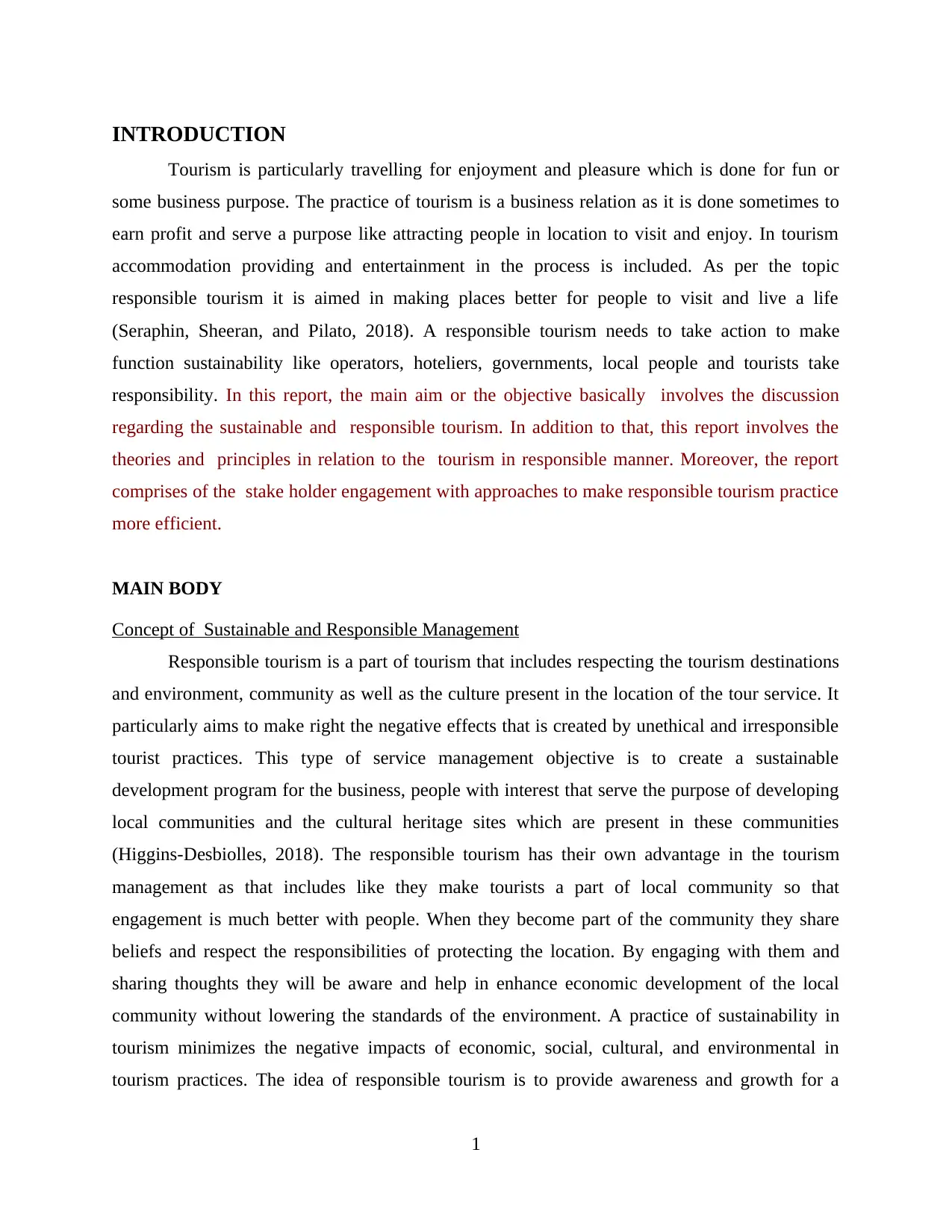
INTRODUCTION
Tourism is particularly travelling for enjoyment and pleasure which is done for fun or
some business purpose. The practice of tourism is a business relation as it is done sometimes to
earn profit and serve a purpose like attracting people in location to visit and enjoy. In tourism
accommodation providing and entertainment in the process is included. As per the topic
responsible tourism it is aimed in making places better for people to visit and live a life
(Seraphin, Sheeran, and Pilato, 2018). A responsible tourism needs to take action to make
function sustainability like operators, hoteliers, governments, local people and tourists take
responsibility. In this report, the main aim or the objective basically involves the discussion
regarding the sustainable and responsible tourism. In addition to that, this report involves the
theories and principles in relation to the tourism in responsible manner. Moreover, the report
comprises of the stake holder engagement with approaches to make responsible tourism practice
more efficient.
MAIN BODY
Concept of Sustainable and Responsible Management
Responsible tourism is a part of tourism that includes respecting the tourism destinations
and environment, community as well as the culture present in the location of the tour service. It
particularly aims to make right the negative effects that is created by unethical and irresponsible
tourist practices. This type of service management objective is to create a sustainable
development program for the business, people with interest that serve the purpose of developing
local communities and the cultural heritage sites which are present in these communities
(Higgins-Desbiolles, 2018). The responsible tourism has their own advantage in the tourism
management as that includes like they make tourists a part of local community so that
engagement is much better with people. When they become part of the community they share
beliefs and respect the responsibilities of protecting the location. By engaging with them and
sharing thoughts they will be aware and help in enhance economic development of the local
community without lowering the standards of the environment. A practice of sustainability in
tourism minimizes the negative impacts of economic, social, cultural, and environmental in
tourism practices. The idea of responsible tourism is to provide awareness and growth for a
1
Tourism is particularly travelling for enjoyment and pleasure which is done for fun or
some business purpose. The practice of tourism is a business relation as it is done sometimes to
earn profit and serve a purpose like attracting people in location to visit and enjoy. In tourism
accommodation providing and entertainment in the process is included. As per the topic
responsible tourism it is aimed in making places better for people to visit and live a life
(Seraphin, Sheeran, and Pilato, 2018). A responsible tourism needs to take action to make
function sustainability like operators, hoteliers, governments, local people and tourists take
responsibility. In this report, the main aim or the objective basically involves the discussion
regarding the sustainable and responsible tourism. In addition to that, this report involves the
theories and principles in relation to the tourism in responsible manner. Moreover, the report
comprises of the stake holder engagement with approaches to make responsible tourism practice
more efficient.
MAIN BODY
Concept of Sustainable and Responsible Management
Responsible tourism is a part of tourism that includes respecting the tourism destinations
and environment, community as well as the culture present in the location of the tour service. It
particularly aims to make right the negative effects that is created by unethical and irresponsible
tourist practices. This type of service management objective is to create a sustainable
development program for the business, people with interest that serve the purpose of developing
local communities and the cultural heritage sites which are present in these communities
(Higgins-Desbiolles, 2018). The responsible tourism has their own advantage in the tourism
management as that includes like they make tourists a part of local community so that
engagement is much better with people. When they become part of the community they share
beliefs and respect the responsibilities of protecting the location. By engaging with them and
sharing thoughts they will be aware and help in enhance economic development of the local
community without lowering the standards of the environment. A practice of sustainability in
tourism minimizes the negative impacts of economic, social, cultural, and environmental in
tourism practices. The idea of responsible tourism is to provide awareness and growth for a
1
⊘ This is a preview!⊘
Do you want full access?
Subscribe today to unlock all pages.

Trusted by 1+ million students worldwide
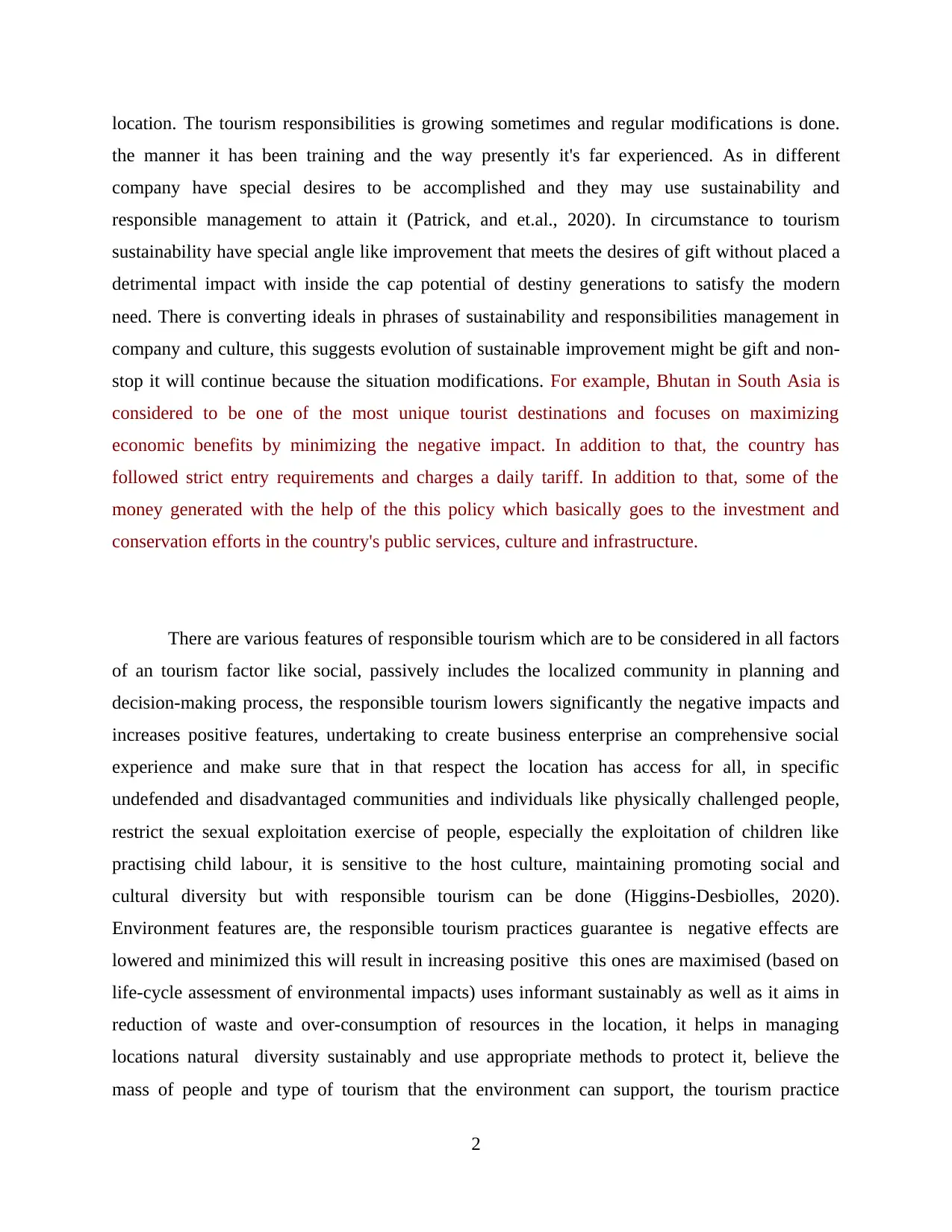
location. The tourism responsibilities is growing sometimes and regular modifications is done.
the manner it has been training and the way presently it's far experienced. As in different
company have special desires to be accomplished and they may use sustainability and
responsible management to attain it (Patrick, and et.al., 2020). In circumstance to tourism
sustainability have special angle like improvement that meets the desires of gift without placed a
detrimental impact with inside the cap potential of destiny generations to satisfy the modern
need. There is converting ideals in phrases of sustainability and responsibilities management in
company and culture, this suggests evolution of sustainable improvement might be gift and non-
stop it will continue because the situation modifications. For example, Bhutan in South Asia is
considered to be one of the most unique tourist destinations and focuses on maximizing
economic benefits by minimizing the negative impact. In addition to that, the country has
followed strict entry requirements and charges a daily tariff. In addition to that, some of the
money generated with the help of the this policy which basically goes to the investment and
conservation efforts in the country's public services, culture and infrastructure.
There are various features of responsible tourism which are to be considered in all factors
of an tourism factor like social, passively includes the localized community in planning and
decision-making process, the responsible tourism lowers significantly the negative impacts and
increases positive features, undertaking to create business enterprise an comprehensive social
experience and make sure that in that respect the location has access for all, in specific
undefended and disadvantaged communities and individuals like physically challenged people,
restrict the sexual exploitation exercise of people, especially the exploitation of children like
practising child labour, it is sensitive to the host culture, maintaining promoting social and
cultural diversity but with responsible tourism can be done (Higgins-Desbiolles, 2020).
Environment features are, the responsible tourism practices guarantee is negative effects are
lowered and minimized this will result in increasing positive this ones are maximised (based on
life-cycle assessment of environmental impacts) uses informant sustainably as well as it aims in
reduction of waste and over-consumption of resources in the location, it helps in managing
locations natural diversity sustainably and use appropriate methods to protect it, believe the
mass of people and type of tourism that the environment can support, the tourism practice
2
the manner it has been training and the way presently it's far experienced. As in different
company have special desires to be accomplished and they may use sustainability and
responsible management to attain it (Patrick, and et.al., 2020). In circumstance to tourism
sustainability have special angle like improvement that meets the desires of gift without placed a
detrimental impact with inside the cap potential of destiny generations to satisfy the modern
need. There is converting ideals in phrases of sustainability and responsibilities management in
company and culture, this suggests evolution of sustainable improvement might be gift and non-
stop it will continue because the situation modifications. For example, Bhutan in South Asia is
considered to be one of the most unique tourist destinations and focuses on maximizing
economic benefits by minimizing the negative impact. In addition to that, the country has
followed strict entry requirements and charges a daily tariff. In addition to that, some of the
money generated with the help of the this policy which basically goes to the investment and
conservation efforts in the country's public services, culture and infrastructure.
There are various features of responsible tourism which are to be considered in all factors
of an tourism factor like social, passively includes the localized community in planning and
decision-making process, the responsible tourism lowers significantly the negative impacts and
increases positive features, undertaking to create business enterprise an comprehensive social
experience and make sure that in that respect the location has access for all, in specific
undefended and disadvantaged communities and individuals like physically challenged people,
restrict the sexual exploitation exercise of people, especially the exploitation of children like
practising child labour, it is sensitive to the host culture, maintaining promoting social and
cultural diversity but with responsible tourism can be done (Higgins-Desbiolles, 2020).
Environment features are, the responsible tourism practices guarantee is negative effects are
lowered and minimized this will result in increasing positive this ones are maximised (based on
life-cycle assessment of environmental impacts) uses informant sustainably as well as it aims in
reduction of waste and over-consumption of resources in the location, it helps in managing
locations natural diversity sustainably and use appropriate methods to protect it, believe the
mass of people and type of tourism that the environment can support, the tourism practice
2
Paraphrase This Document
Need a fresh take? Get an instant paraphrase of this document with our AI Paraphraser
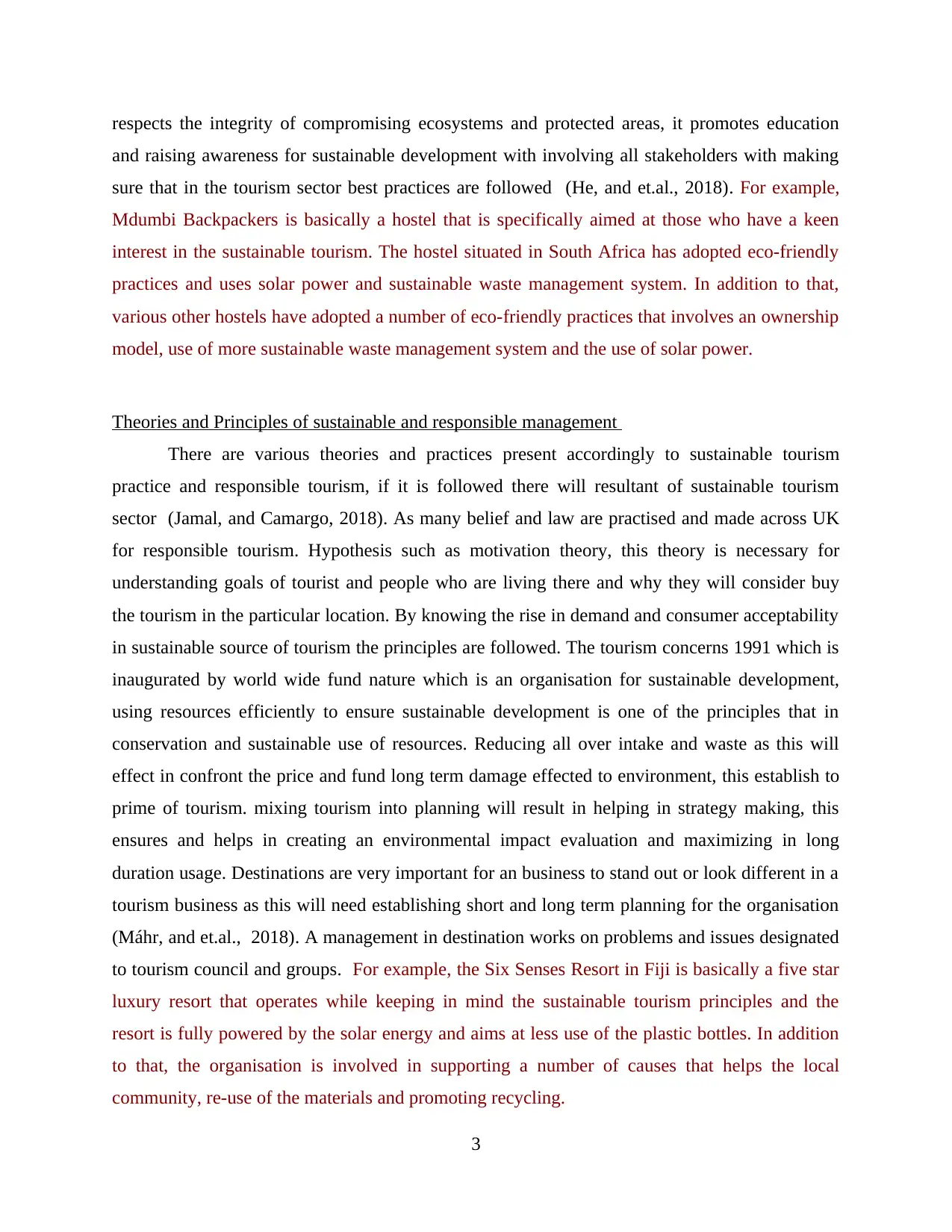
respects the integrity of compromising ecosystems and protected areas, it promotes education
and raising awareness for sustainable development with involving all stakeholders with making
sure that in the tourism sector best practices are followed (He, and et.al., 2018). For example,
Mdumbi Backpackers is basically a hostel that is specifically aimed at those who have a keen
interest in the sustainable tourism. The hostel situated in South Africa has adopted eco-friendly
practices and uses solar power and sustainable waste management system. In addition to that,
various other hostels have adopted a number of eco-friendly practices that involves an ownership
model, use of more sustainable waste management system and the use of solar power.
Theories and Principles of sustainable and responsible management
There are various theories and practices present accordingly to sustainable tourism
practice and responsible tourism, if it is followed there will resultant of sustainable tourism
sector (Jamal, and Camargo, 2018). As many belief and law are practised and made across UK
for responsible tourism. Hypothesis such as motivation theory, this theory is necessary for
understanding goals of tourist and people who are living there and why they will consider buy
the tourism in the particular location. By knowing the rise in demand and consumer acceptability
in sustainable source of tourism the principles are followed. The tourism concerns 1991 which is
inaugurated by world wide fund nature which is an organisation for sustainable development,
using resources efficiently to ensure sustainable development is one of the principles that in
conservation and sustainable use of resources. Reducing all over intake and waste as this will
effect in confront the price and fund long term damage effected to environment, this establish to
prime of tourism. mixing tourism into planning will result in helping in strategy making, this
ensures and helps in creating an environmental impact evaluation and maximizing in long
duration usage. Destinations are very important for an business to stand out or look different in a
tourism business as this will need establishing short and long term planning for the organisation
(Máhr, and et.al., 2018). A management in destination works on problems and issues designated
to tourism council and groups. For example, the Six Senses Resort in Fiji is basically a five star
luxury resort that operates while keeping in mind the sustainable tourism principles and the
resort is fully powered by the solar energy and aims at less use of the plastic bottles. In addition
to that, the organisation is involved in supporting a number of causes that helps the local
community, re-use of the materials and promoting recycling.
3
and raising awareness for sustainable development with involving all stakeholders with making
sure that in the tourism sector best practices are followed (He, and et.al., 2018). For example,
Mdumbi Backpackers is basically a hostel that is specifically aimed at those who have a keen
interest in the sustainable tourism. The hostel situated in South Africa has adopted eco-friendly
practices and uses solar power and sustainable waste management system. In addition to that,
various other hostels have adopted a number of eco-friendly practices that involves an ownership
model, use of more sustainable waste management system and the use of solar power.
Theories and Principles of sustainable and responsible management
There are various theories and practices present accordingly to sustainable tourism
practice and responsible tourism, if it is followed there will resultant of sustainable tourism
sector (Jamal, and Camargo, 2018). As many belief and law are practised and made across UK
for responsible tourism. Hypothesis such as motivation theory, this theory is necessary for
understanding goals of tourist and people who are living there and why they will consider buy
the tourism in the particular location. By knowing the rise in demand and consumer acceptability
in sustainable source of tourism the principles are followed. The tourism concerns 1991 which is
inaugurated by world wide fund nature which is an organisation for sustainable development,
using resources efficiently to ensure sustainable development is one of the principles that in
conservation and sustainable use of resources. Reducing all over intake and waste as this will
effect in confront the price and fund long term damage effected to environment, this establish to
prime of tourism. mixing tourism into planning will result in helping in strategy making, this
ensures and helps in creating an environmental impact evaluation and maximizing in long
duration usage. Destinations are very important for an business to stand out or look different in a
tourism business as this will need establishing short and long term planning for the organisation
(Máhr, and et.al., 2018). A management in destination works on problems and issues designated
to tourism council and groups. For example, the Six Senses Resort in Fiji is basically a five star
luxury resort that operates while keeping in mind the sustainable tourism principles and the
resort is fully powered by the solar energy and aims at less use of the plastic bottles. In addition
to that, the organisation is involved in supporting a number of causes that helps the local
community, re-use of the materials and promoting recycling.
3
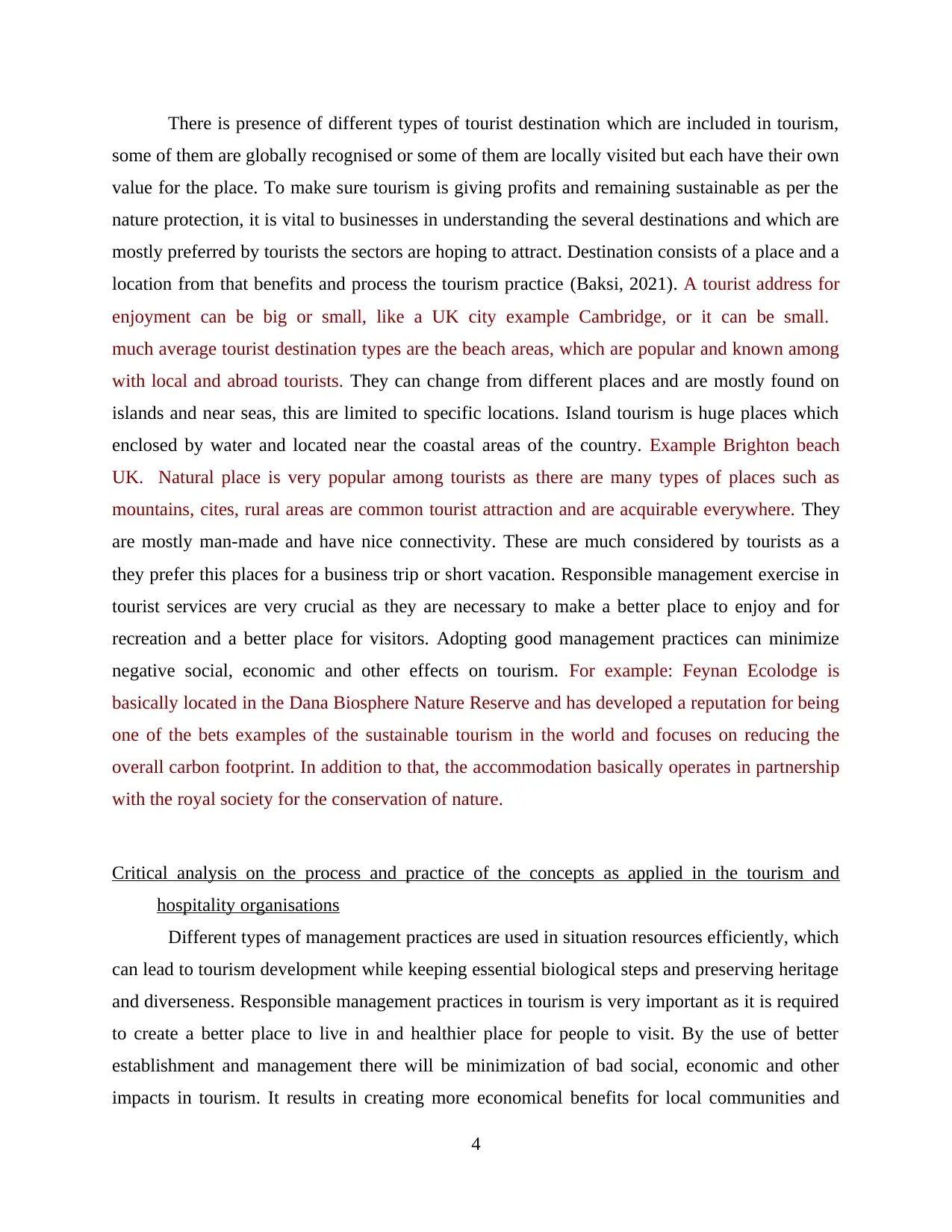
There is presence of different types of tourist destination which are included in tourism,
some of them are globally recognised or some of them are locally visited but each have their own
value for the place. To make sure tourism is giving profits and remaining sustainable as per the
nature protection, it is vital to businesses in understanding the several destinations and which are
mostly preferred by tourists the sectors are hoping to attract. Destination consists of a place and a
location from that benefits and process the tourism practice (Baksi, 2021). A tourist address for
enjoyment can be big or small, like a UK city example Cambridge, or it can be small.
much average tourist destination types are the beach areas, which are popular and known among
with local and abroad tourists. They can change from different places and are mostly found on
islands and near seas, this are limited to specific locations. Island tourism is huge places which
enclosed by water and located near the coastal areas of the country. Example Brighton beach
UK. Natural place is very popular among tourists as there are many types of places such as
mountains, cites, rural areas are common tourist attraction and are acquirable everywhere. They
are mostly man-made and have nice connectivity. These are much considered by tourists as a
they prefer this places for a business trip or short vacation. Responsible management exercise in
tourist services are very crucial as they are necessary to make a better place to enjoy and for
recreation and a better place for visitors. Adopting good management practices can minimize
negative social, economic and other effects on tourism. For example: Feynan Ecolodge is
basically located in the Dana Biosphere Nature Reserve and has developed a reputation for being
one of the bets examples of the sustainable tourism in the world and focuses on reducing the
overall carbon footprint. In addition to that, the accommodation basically operates in partnership
with the royal society for the conservation of nature.
Critical analysis on the process and practice of the concepts as applied in the tourism and
hospitality organisations
Different types of management practices are used in situation resources efficiently, which
can lead to tourism development while keeping essential biological steps and preserving heritage
and diverseness. Responsible management practices in tourism is very important as it is required
to create a better place to live in and healthier place for people to visit. By the use of better
establishment and management there will be minimization of bad social, economic and other
impacts in tourism. It results in creating more economical benefits for local communities and
4
some of them are globally recognised or some of them are locally visited but each have their own
value for the place. To make sure tourism is giving profits and remaining sustainable as per the
nature protection, it is vital to businesses in understanding the several destinations and which are
mostly preferred by tourists the sectors are hoping to attract. Destination consists of a place and a
location from that benefits and process the tourism practice (Baksi, 2021). A tourist address for
enjoyment can be big or small, like a UK city example Cambridge, or it can be small.
much average tourist destination types are the beach areas, which are popular and known among
with local and abroad tourists. They can change from different places and are mostly found on
islands and near seas, this are limited to specific locations. Island tourism is huge places which
enclosed by water and located near the coastal areas of the country. Example Brighton beach
UK. Natural place is very popular among tourists as there are many types of places such as
mountains, cites, rural areas are common tourist attraction and are acquirable everywhere. They
are mostly man-made and have nice connectivity. These are much considered by tourists as a
they prefer this places for a business trip or short vacation. Responsible management exercise in
tourist services are very crucial as they are necessary to make a better place to enjoy and for
recreation and a better place for visitors. Adopting good management practices can minimize
negative social, economic and other effects on tourism. For example: Feynan Ecolodge is
basically located in the Dana Biosphere Nature Reserve and has developed a reputation for being
one of the bets examples of the sustainable tourism in the world and focuses on reducing the
overall carbon footprint. In addition to that, the accommodation basically operates in partnership
with the royal society for the conservation of nature.
Critical analysis on the process and practice of the concepts as applied in the tourism and
hospitality organisations
Different types of management practices are used in situation resources efficiently, which
can lead to tourism development while keeping essential biological steps and preserving heritage
and diverseness. Responsible management practices in tourism is very important as it is required
to create a better place to live in and healthier place for people to visit. By the use of better
establishment and management there will be minimization of bad social, economic and other
impacts in tourism. It results in creating more economical benefits for local communities and
4
⊘ This is a preview!⊘
Do you want full access?
Subscribe today to unlock all pages.

Trusted by 1+ million students worldwide
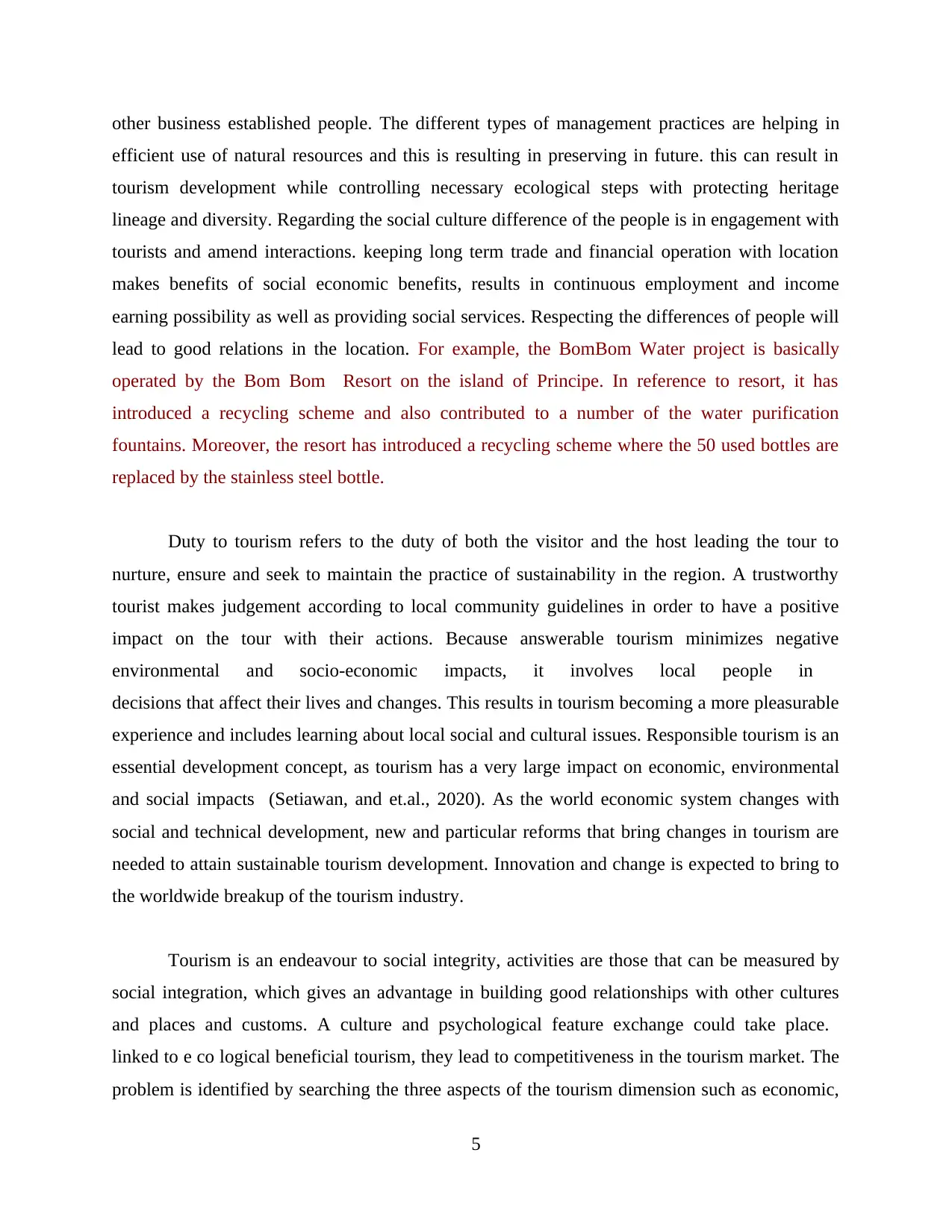
other business established people. The different types of management practices are helping in
efficient use of natural resources and this is resulting in preserving in future. this can result in
tourism development while controlling necessary ecological steps with protecting heritage
lineage and diversity. Regarding the social culture difference of the people is in engagement with
tourists and amend interactions. keeping long term trade and financial operation with location
makes benefits of social economic benefits, results in continuous employment and income
earning possibility as well as providing social services. Respecting the differences of people will
lead to good relations in the location. For example, the BomBom Water project is basically
operated by the Bom Bom Resort on the island of Principe. In reference to resort, it has
introduced a recycling scheme and also contributed to a number of the water purification
fountains. Moreover, the resort has introduced a recycling scheme where the 50 used bottles are
replaced by the stainless steel bottle.
Duty to tourism refers to the duty of both the visitor and the host leading the tour to
nurture, ensure and seek to maintain the practice of sustainability in the region. A trustworthy
tourist makes judgement according to local community guidelines in order to have a positive
impact on the tour with their actions. Because answerable tourism minimizes negative
environmental and socio-economic impacts, it involves local people in
decisions that affect their lives and changes. This results in tourism becoming a more pleasurable
experience and includes learning about local social and cultural issues. Responsible tourism is an
essential development concept, as tourism has a very large impact on economic, environmental
and social impacts (Setiawan, and et.al., 2020). As the world economic system changes with
social and technical development, new and particular reforms that bring changes in tourism are
needed to attain sustainable tourism development. Innovation and change is expected to bring to
the worldwide breakup of the tourism industry.
Tourism is an endeavour to social integrity, activities are those that can be measured by
social integration, which gives an advantage in building good relationships with other cultures
and places and customs. A culture and psychological feature exchange could take place.
linked to e co logical beneficial tourism, they lead to competitiveness in the tourism market. The
problem is identified by searching the three aspects of the tourism dimension such as economic,
5
efficient use of natural resources and this is resulting in preserving in future. this can result in
tourism development while controlling necessary ecological steps with protecting heritage
lineage and diversity. Regarding the social culture difference of the people is in engagement with
tourists and amend interactions. keeping long term trade and financial operation with location
makes benefits of social economic benefits, results in continuous employment and income
earning possibility as well as providing social services. Respecting the differences of people will
lead to good relations in the location. For example, the BomBom Water project is basically
operated by the Bom Bom Resort on the island of Principe. In reference to resort, it has
introduced a recycling scheme and also contributed to a number of the water purification
fountains. Moreover, the resort has introduced a recycling scheme where the 50 used bottles are
replaced by the stainless steel bottle.
Duty to tourism refers to the duty of both the visitor and the host leading the tour to
nurture, ensure and seek to maintain the practice of sustainability in the region. A trustworthy
tourist makes judgement according to local community guidelines in order to have a positive
impact on the tour with their actions. Because answerable tourism minimizes negative
environmental and socio-economic impacts, it involves local people in
decisions that affect their lives and changes. This results in tourism becoming a more pleasurable
experience and includes learning about local social and cultural issues. Responsible tourism is an
essential development concept, as tourism has a very large impact on economic, environmental
and social impacts (Setiawan, and et.al., 2020). As the world economic system changes with
social and technical development, new and particular reforms that bring changes in tourism are
needed to attain sustainable tourism development. Innovation and change is expected to bring to
the worldwide breakup of the tourism industry.
Tourism is an endeavour to social integrity, activities are those that can be measured by
social integration, which gives an advantage in building good relationships with other cultures
and places and customs. A culture and psychological feature exchange could take place.
linked to e co logical beneficial tourism, they lead to competitiveness in the tourism market. The
problem is identified by searching the three aspects of the tourism dimension such as economic,
5
Paraphrase This Document
Need a fresh take? Get an instant paraphrase of this document with our AI Paraphraser
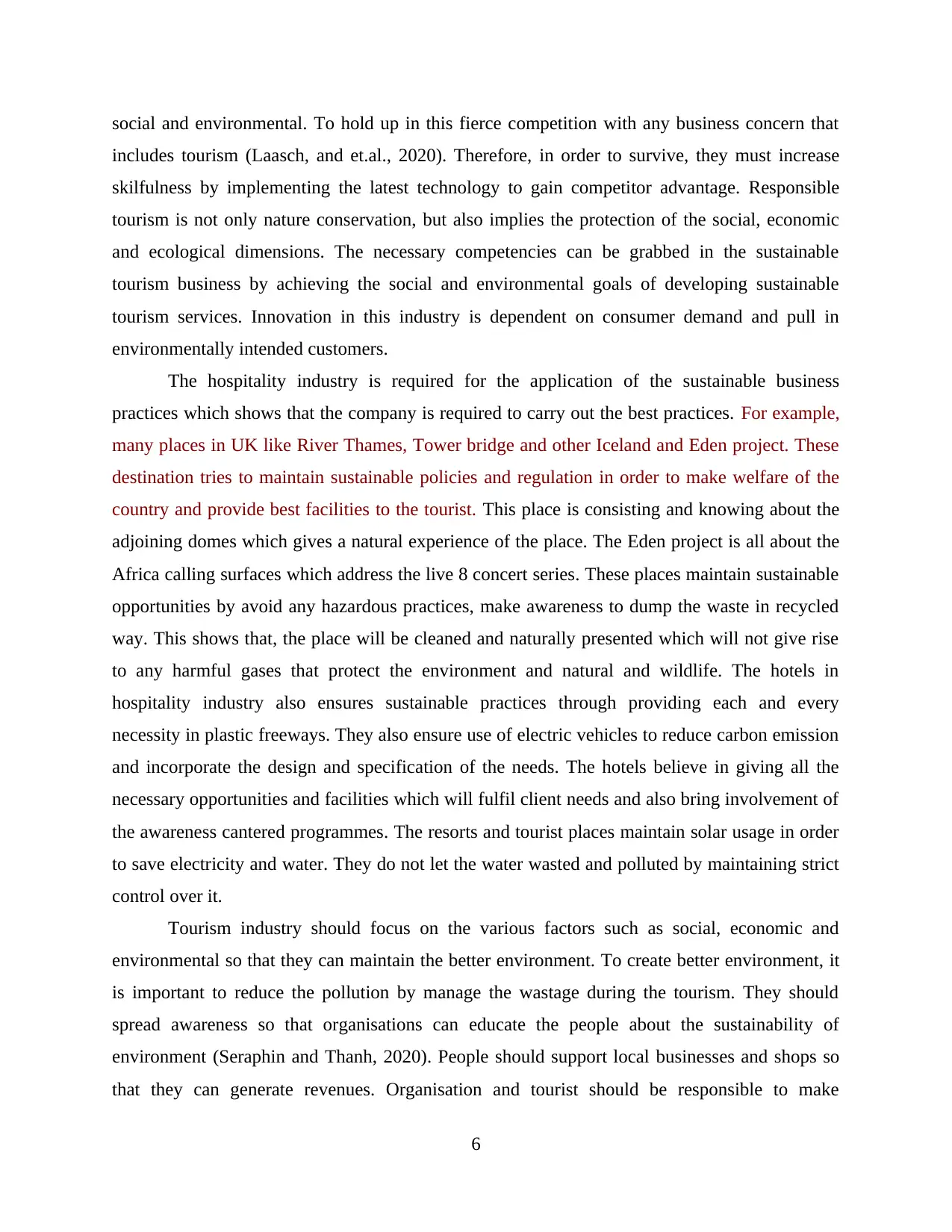
social and environmental. To hold up in this fierce competition with any business concern that
includes tourism (Laasch, and et.al., 2020). Therefore, in order to survive, they must increase
skilfulness by implementing the latest technology to gain competitor advantage. Responsible
tourism is not only nature conservation, but also implies the protection of the social, economic
and ecological dimensions. The necessary competencies can be grabbed in the sustainable
tourism business by achieving the social and environmental goals of developing sustainable
tourism services. Innovation in this industry is dependent on consumer demand and pull in
environmentally intended customers.
The hospitality industry is required for the application of the sustainable business
practices which shows that the company is required to carry out the best practices. For example,
many places in UK like River Thames, Tower bridge and other Iceland and Eden project. These
destination tries to maintain sustainable policies and regulation in order to make welfare of the
country and provide best facilities to the tourist. This place is consisting and knowing about the
adjoining domes which gives a natural experience of the place. The Eden project is all about the
Africa calling surfaces which address the live 8 concert series. These places maintain sustainable
opportunities by avoid any hazardous practices, make awareness to dump the waste in recycled
way. This shows that, the place will be cleaned and naturally presented which will not give rise
to any harmful gases that protect the environment and natural and wildlife. The hotels in
hospitality industry also ensures sustainable practices through providing each and every
necessity in plastic freeways. They also ensure use of electric vehicles to reduce carbon emission
and incorporate the design and specification of the needs. The hotels believe in giving all the
necessary opportunities and facilities which will fulfil client needs and also bring involvement of
the awareness cantered programmes. The resorts and tourist places maintain solar usage in order
to save electricity and water. They do not let the water wasted and polluted by maintaining strict
control over it.
Tourism industry should focus on the various factors such as social, economic and
environmental so that they can maintain the better environment. To create better environment, it
is important to reduce the pollution by manage the wastage during the tourism. They should
spread awareness so that organisations can educate the people about the sustainability of
environment (Seraphin and Thanh, 2020). People should support local businesses and shops so
that they can generate revenues. Organisation and tourist should be responsible to make
6
includes tourism (Laasch, and et.al., 2020). Therefore, in order to survive, they must increase
skilfulness by implementing the latest technology to gain competitor advantage. Responsible
tourism is not only nature conservation, but also implies the protection of the social, economic
and ecological dimensions. The necessary competencies can be grabbed in the sustainable
tourism business by achieving the social and environmental goals of developing sustainable
tourism services. Innovation in this industry is dependent on consumer demand and pull in
environmentally intended customers.
The hospitality industry is required for the application of the sustainable business
practices which shows that the company is required to carry out the best practices. For example,
many places in UK like River Thames, Tower bridge and other Iceland and Eden project. These
destination tries to maintain sustainable policies and regulation in order to make welfare of the
country and provide best facilities to the tourist. This place is consisting and knowing about the
adjoining domes which gives a natural experience of the place. The Eden project is all about the
Africa calling surfaces which address the live 8 concert series. These places maintain sustainable
opportunities by avoid any hazardous practices, make awareness to dump the waste in recycled
way. This shows that, the place will be cleaned and naturally presented which will not give rise
to any harmful gases that protect the environment and natural and wildlife. The hotels in
hospitality industry also ensures sustainable practices through providing each and every
necessity in plastic freeways. They also ensure use of electric vehicles to reduce carbon emission
and incorporate the design and specification of the needs. The hotels believe in giving all the
necessary opportunities and facilities which will fulfil client needs and also bring involvement of
the awareness cantered programmes. The resorts and tourist places maintain solar usage in order
to save electricity and water. They do not let the water wasted and polluted by maintaining strict
control over it.
Tourism industry should focus on the various factors such as social, economic and
environmental so that they can maintain the better environment. To create better environment, it
is important to reduce the pollution by manage the wastage during the tourism. They should
spread awareness so that organisations can educate the people about the sustainability of
environment (Seraphin and Thanh, 2020). People should support local businesses and shops so
that they can generate revenues. Organisation and tourist should be responsible to make
6
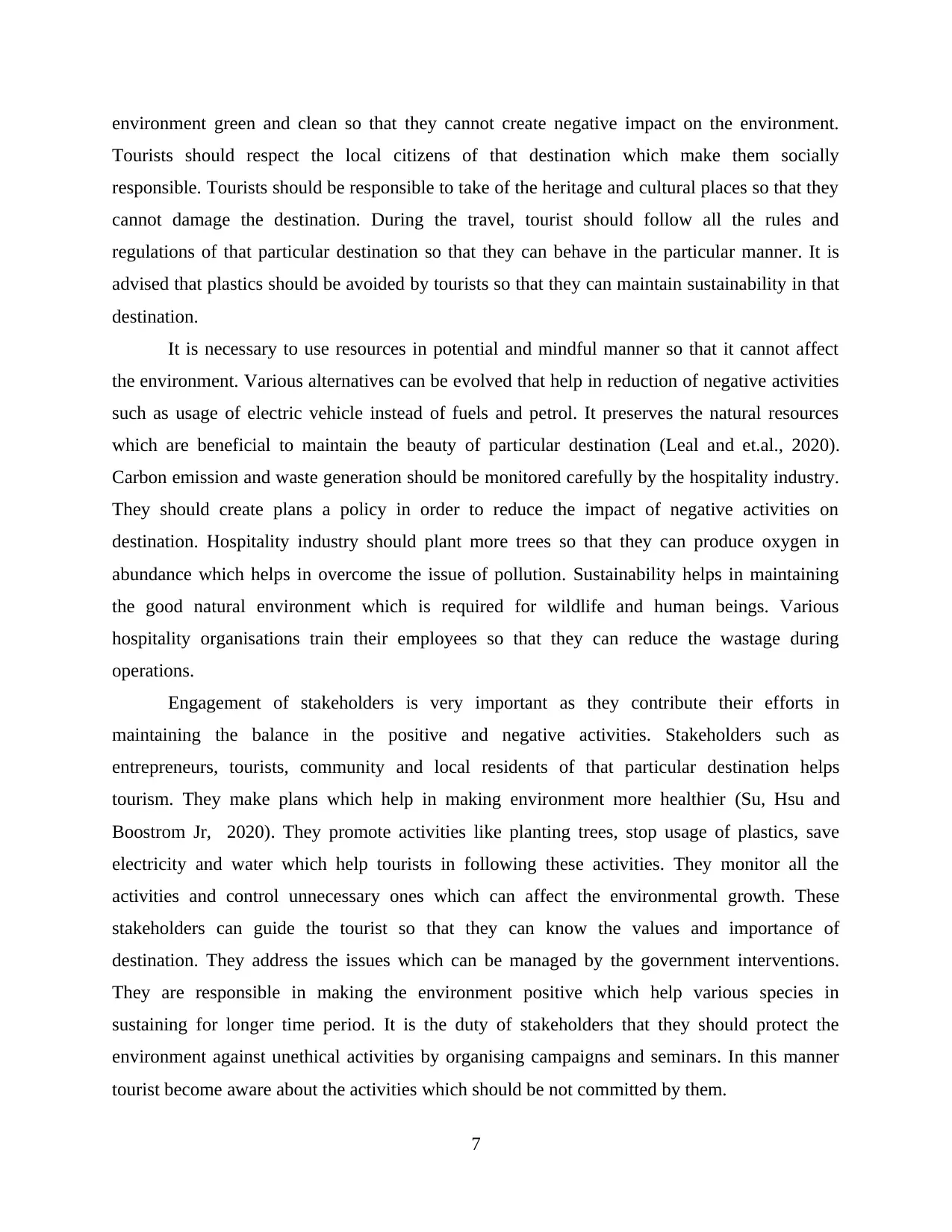
environment green and clean so that they cannot create negative impact on the environment.
Tourists should respect the local citizens of that destination which make them socially
responsible. Tourists should be responsible to take of the heritage and cultural places so that they
cannot damage the destination. During the travel, tourist should follow all the rules and
regulations of that particular destination so that they can behave in the particular manner. It is
advised that plastics should be avoided by tourists so that they can maintain sustainability in that
destination.
It is necessary to use resources in potential and mindful manner so that it cannot affect
the environment. Various alternatives can be evolved that help in reduction of negative activities
such as usage of electric vehicle instead of fuels and petrol. It preserves the natural resources
which are beneficial to maintain the beauty of particular destination (Leal and et.al., 2020).
Carbon emission and waste generation should be monitored carefully by the hospitality industry.
They should create plans a policy in order to reduce the impact of negative activities on
destination. Hospitality industry should plant more trees so that they can produce oxygen in
abundance which helps in overcome the issue of pollution. Sustainability helps in maintaining
the good natural environment which is required for wildlife and human beings. Various
hospitality organisations train their employees so that they can reduce the wastage during
operations.
Engagement of stakeholders is very important as they contribute their efforts in
maintaining the balance in the positive and negative activities. Stakeholders such as
entrepreneurs, tourists, community and local residents of that particular destination helps
tourism. They make plans which help in making environment more healthier (Su, Hsu and
Boostrom Jr, 2020). They promote activities like planting trees, stop usage of plastics, save
electricity and water which help tourists in following these activities. They monitor all the
activities and control unnecessary ones which can affect the environmental growth. These
stakeholders can guide the tourist so that they can know the values and importance of
destination. They address the issues which can be managed by the government interventions.
They are responsible in making the environment positive which help various species in
sustaining for longer time period. It is the duty of stakeholders that they should protect the
environment against unethical activities by organising campaigns and seminars. In this manner
tourist become aware about the activities which should be not committed by them.
7
Tourists should respect the local citizens of that destination which make them socially
responsible. Tourists should be responsible to take of the heritage and cultural places so that they
cannot damage the destination. During the travel, tourist should follow all the rules and
regulations of that particular destination so that they can behave in the particular manner. It is
advised that plastics should be avoided by tourists so that they can maintain sustainability in that
destination.
It is necessary to use resources in potential and mindful manner so that it cannot affect
the environment. Various alternatives can be evolved that help in reduction of negative activities
such as usage of electric vehicle instead of fuels and petrol. It preserves the natural resources
which are beneficial to maintain the beauty of particular destination (Leal and et.al., 2020).
Carbon emission and waste generation should be monitored carefully by the hospitality industry.
They should create plans a policy in order to reduce the impact of negative activities on
destination. Hospitality industry should plant more trees so that they can produce oxygen in
abundance which helps in overcome the issue of pollution. Sustainability helps in maintaining
the good natural environment which is required for wildlife and human beings. Various
hospitality organisations train their employees so that they can reduce the wastage during
operations.
Engagement of stakeholders is very important as they contribute their efforts in
maintaining the balance in the positive and negative activities. Stakeholders such as
entrepreneurs, tourists, community and local residents of that particular destination helps
tourism. They make plans which help in making environment more healthier (Su, Hsu and
Boostrom Jr, 2020). They promote activities like planting trees, stop usage of plastics, save
electricity and water which help tourists in following these activities. They monitor all the
activities and control unnecessary ones which can affect the environmental growth. These
stakeholders can guide the tourist so that they can know the values and importance of
destination. They address the issues which can be managed by the government interventions.
They are responsible in making the environment positive which help various species in
sustaining for longer time period. It is the duty of stakeholders that they should protect the
environment against unethical activities by organising campaigns and seminars. In this manner
tourist become aware about the activities which should be not committed by them.
7
⊘ This is a preview!⊘
Do you want full access?
Subscribe today to unlock all pages.

Trusted by 1+ million students worldwide
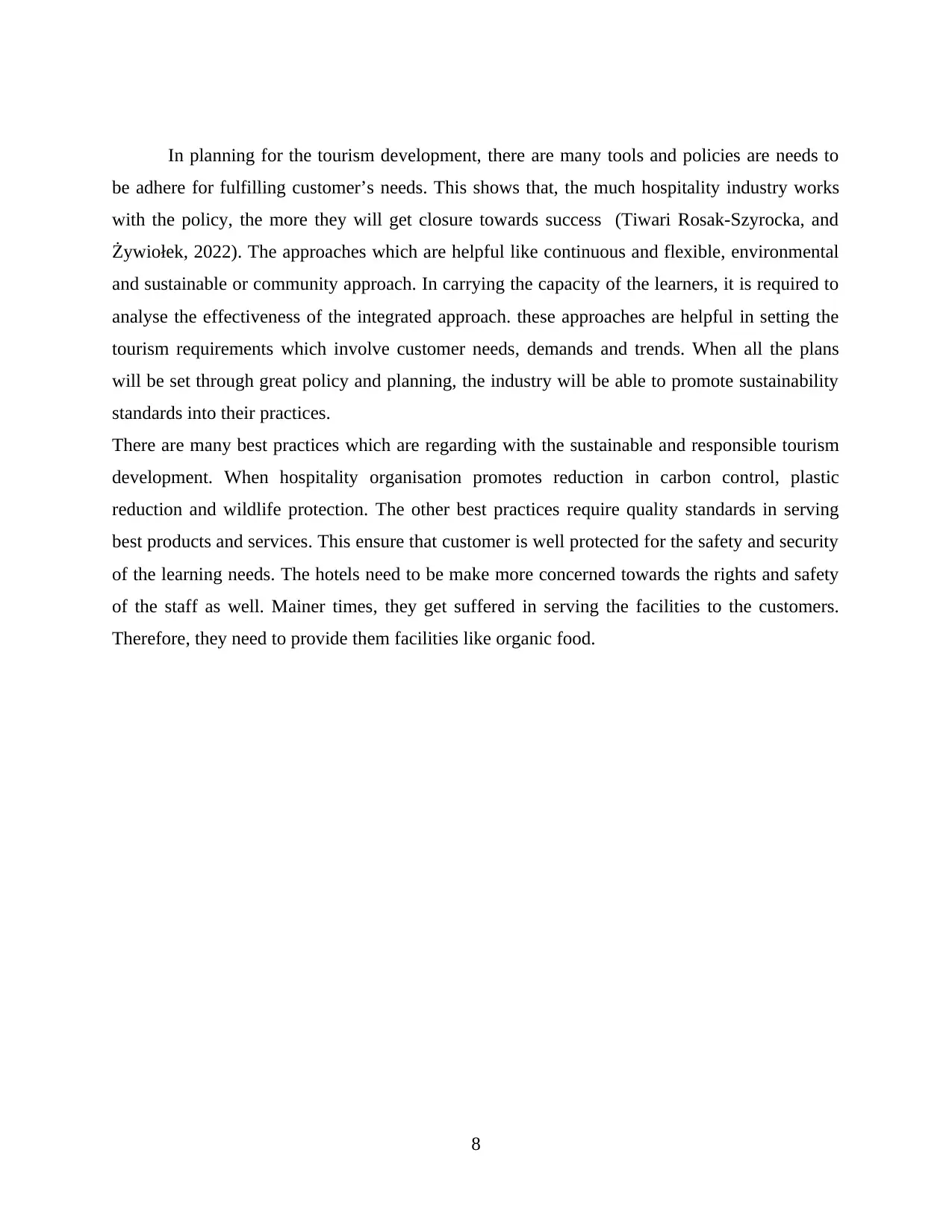
In planning for the tourism development, there are many tools and policies are needs to
be adhere for fulfilling customer’s needs. This shows that, the much hospitality industry works
with the policy, the more they will get closure towards success (Tiwari Rosak-Szyrocka, and
Żywiołek, 2022). The approaches which are helpful like continuous and flexible, environmental
and sustainable or community approach. In carrying the capacity of the learners, it is required to
analyse the effectiveness of the integrated approach. these approaches are helpful in setting the
tourism requirements which involve customer needs, demands and trends. When all the plans
will be set through great policy and planning, the industry will be able to promote sustainability
standards into their practices.
There are many best practices which are regarding with the sustainable and responsible tourism
development. When hospitality organisation promotes reduction in carbon control, plastic
reduction and wildlife protection. The other best practices require quality standards in serving
best products and services. This ensure that customer is well protected for the safety and security
of the learning needs. The hotels need to be make more concerned towards the rights and safety
of the staff as well. Mainer times, they get suffered in serving the facilities to the customers.
Therefore, they need to provide them facilities like organic food.
8
be adhere for fulfilling customer’s needs. This shows that, the much hospitality industry works
with the policy, the more they will get closure towards success (Tiwari Rosak-Szyrocka, and
Żywiołek, 2022). The approaches which are helpful like continuous and flexible, environmental
and sustainable or community approach. In carrying the capacity of the learners, it is required to
analyse the effectiveness of the integrated approach. these approaches are helpful in setting the
tourism requirements which involve customer needs, demands and trends. When all the plans
will be set through great policy and planning, the industry will be able to promote sustainability
standards into their practices.
There are many best practices which are regarding with the sustainable and responsible tourism
development. When hospitality organisation promotes reduction in carbon control, plastic
reduction and wildlife protection. The other best practices require quality standards in serving
best products and services. This ensure that customer is well protected for the safety and security
of the learning needs. The hotels need to be make more concerned towards the rights and safety
of the staff as well. Mainer times, they get suffered in serving the facilities to the customers.
Therefore, they need to provide them facilities like organic food.
8
Paraphrase This Document
Need a fresh take? Get an instant paraphrase of this document with our AI Paraphraser
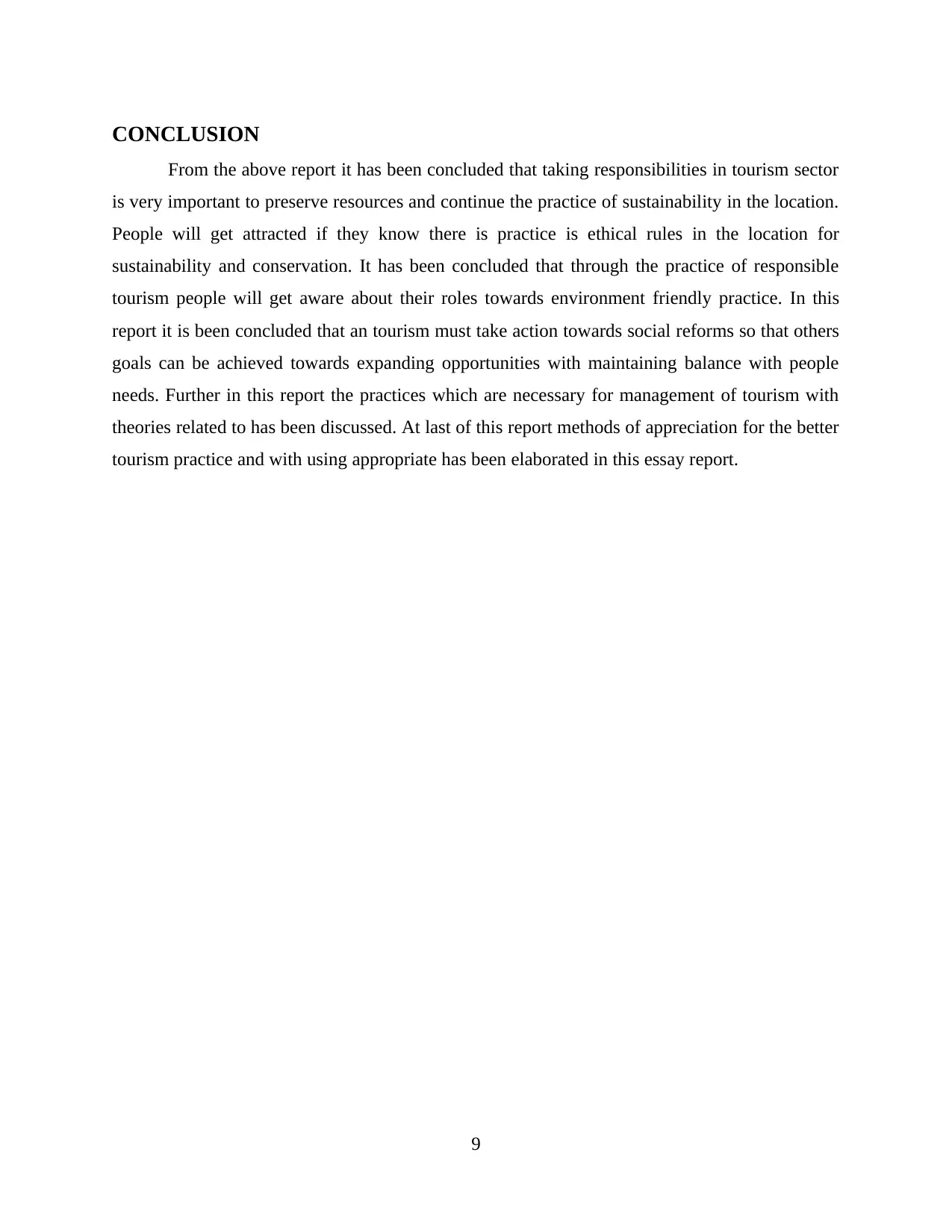
CONCLUSION
From the above report it has been concluded that taking responsibilities in tourism sector
is very important to preserve resources and continue the practice of sustainability in the location.
People will get attracted if they know there is practice is ethical rules in the location for
sustainability and conservation. It has been concluded that through the practice of responsible
tourism people will get aware about their roles towards environment friendly practice. In this
report it is been concluded that an tourism must take action towards social reforms so that others
goals can be achieved towards expanding opportunities with maintaining balance with people
needs. Further in this report the practices which are necessary for management of tourism with
theories related to has been discussed. At last of this report methods of appreciation for the better
tourism practice and with using appropriate has been elaborated in this essay report.
9
From the above report it has been concluded that taking responsibilities in tourism sector
is very important to preserve resources and continue the practice of sustainability in the location.
People will get attracted if they know there is practice is ethical rules in the location for
sustainability and conservation. It has been concluded that through the practice of responsible
tourism people will get aware about their roles towards environment friendly practice. In this
report it is been concluded that an tourism must take action towards social reforms so that others
goals can be achieved towards expanding opportunities with maintaining balance with people
needs. Further in this report the practices which are necessary for management of tourism with
theories related to has been discussed. At last of this report methods of appreciation for the better
tourism practice and with using appropriate has been elaborated in this essay report.
9
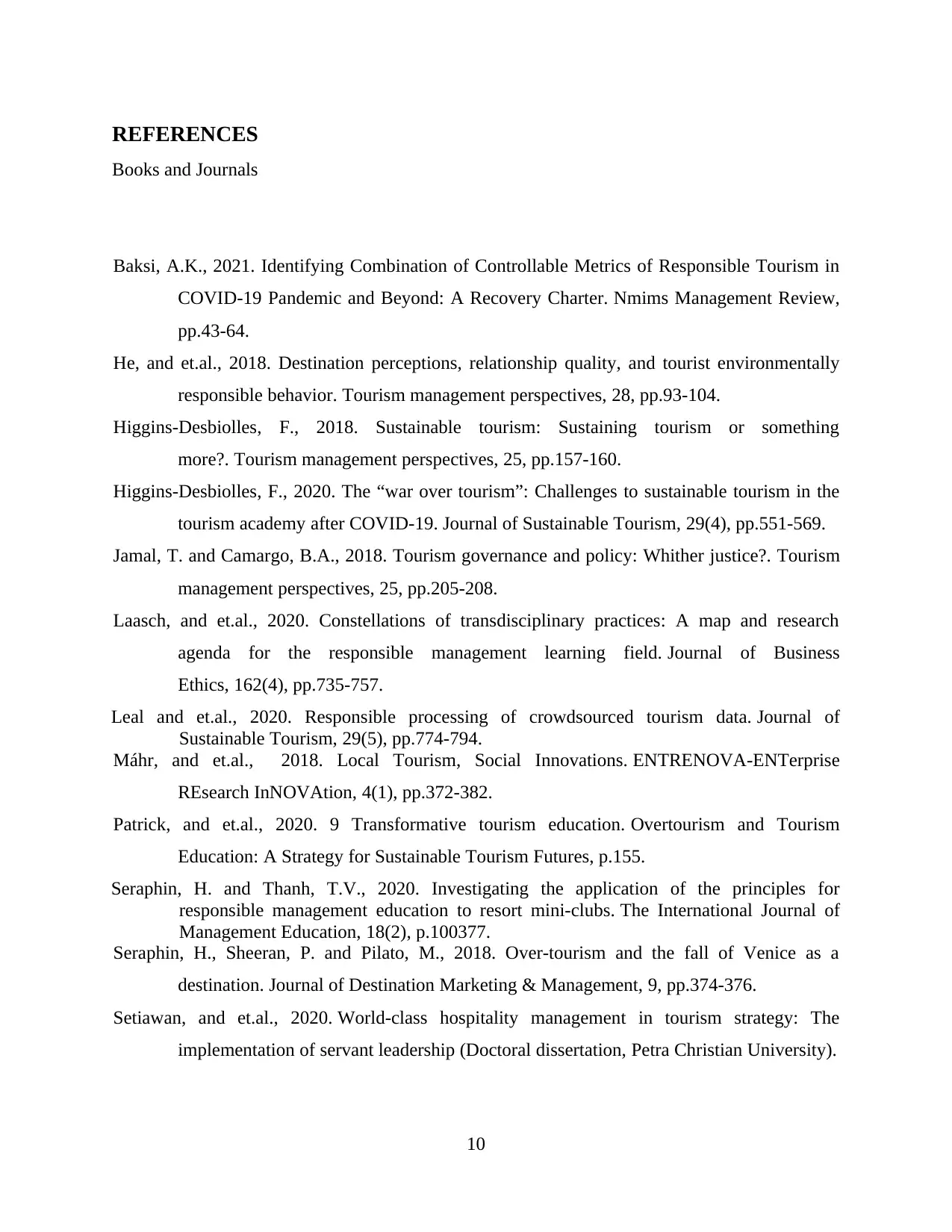
REFERENCES
Books and Journals
Baksi, A.K., 2021. Identifying Combination of Controllable Metrics of Responsible Tourism in
COVID-19 Pandemic and Beyond: A Recovery Charter. Nmims Management Review,
pp.43-64.
He, and et.al., 2018. Destination perceptions, relationship quality, and tourist environmentally
responsible behavior. Tourism management perspectives, 28, pp.93-104.
Higgins-Desbiolles, F., 2018. Sustainable tourism: Sustaining tourism or something
more?. Tourism management perspectives, 25, pp.157-160.
Higgins-Desbiolles, F., 2020. The “war over tourism”: Challenges to sustainable tourism in the
tourism academy after COVID-19. Journal of Sustainable Tourism, 29(4), pp.551-569.
Jamal, T. and Camargo, B.A., 2018. Tourism governance and policy: Whither justice?. Tourism
management perspectives, 25, pp.205-208.
Laasch, and et.al., 2020. Constellations of transdisciplinary practices: A map and research
agenda for the responsible management learning field. Journal of Business
Ethics, 162(4), pp.735-757.
Leal and et.al., 2020. Responsible processing of crowdsourced tourism data. Journal of
Sustainable Tourism, 29(5), pp.774-794.
Máhr, and et.al., 2018. Local Tourism, Social Innovations. ENTRENOVA-ENTerprise
REsearch InNOVAtion, 4(1), pp.372-382.
Patrick, and et.al., 2020. 9 Transformative tourism education. Overtourism and Tourism
Education: A Strategy for Sustainable Tourism Futures, p.155.
Seraphin, H. and Thanh, T.V., 2020. Investigating the application of the principles for
responsible management education to resort mini-clubs. The International Journal of
Management Education, 18(2), p.100377.
Seraphin, H., Sheeran, P. and Pilato, M., 2018. Over-tourism and the fall of Venice as a
destination. Journal of Destination Marketing & Management, 9, pp.374-376.
Setiawan, and et.al., 2020. World-class hospitality management in tourism strategy: The
implementation of servant leadership (Doctoral dissertation, Petra Christian University).
10
Books and Journals
Baksi, A.K., 2021. Identifying Combination of Controllable Metrics of Responsible Tourism in
COVID-19 Pandemic and Beyond: A Recovery Charter. Nmims Management Review,
pp.43-64.
He, and et.al., 2018. Destination perceptions, relationship quality, and tourist environmentally
responsible behavior. Tourism management perspectives, 28, pp.93-104.
Higgins-Desbiolles, F., 2018. Sustainable tourism: Sustaining tourism or something
more?. Tourism management perspectives, 25, pp.157-160.
Higgins-Desbiolles, F., 2020. The “war over tourism”: Challenges to sustainable tourism in the
tourism academy after COVID-19. Journal of Sustainable Tourism, 29(4), pp.551-569.
Jamal, T. and Camargo, B.A., 2018. Tourism governance and policy: Whither justice?. Tourism
management perspectives, 25, pp.205-208.
Laasch, and et.al., 2020. Constellations of transdisciplinary practices: A map and research
agenda for the responsible management learning field. Journal of Business
Ethics, 162(4), pp.735-757.
Leal and et.al., 2020. Responsible processing of crowdsourced tourism data. Journal of
Sustainable Tourism, 29(5), pp.774-794.
Máhr, and et.al., 2018. Local Tourism, Social Innovations. ENTRENOVA-ENTerprise
REsearch InNOVAtion, 4(1), pp.372-382.
Patrick, and et.al., 2020. 9 Transformative tourism education. Overtourism and Tourism
Education: A Strategy for Sustainable Tourism Futures, p.155.
Seraphin, H. and Thanh, T.V., 2020. Investigating the application of the principles for
responsible management education to resort mini-clubs. The International Journal of
Management Education, 18(2), p.100377.
Seraphin, H., Sheeran, P. and Pilato, M., 2018. Over-tourism and the fall of Venice as a
destination. Journal of Destination Marketing & Management, 9, pp.374-376.
Setiawan, and et.al., 2020. World-class hospitality management in tourism strategy: The
implementation of servant leadership (Doctoral dissertation, Petra Christian University).
10
⊘ This is a preview!⊘
Do you want full access?
Subscribe today to unlock all pages.

Trusted by 1+ million students worldwide
1 out of 16
Related Documents
Your All-in-One AI-Powered Toolkit for Academic Success.
+13062052269
info@desklib.com
Available 24*7 on WhatsApp / Email
![[object Object]](/_next/static/media/star-bottom.7253800d.svg)
Unlock your academic potential
Copyright © 2020–2026 A2Z Services. All Rights Reserved. Developed and managed by ZUCOL.



